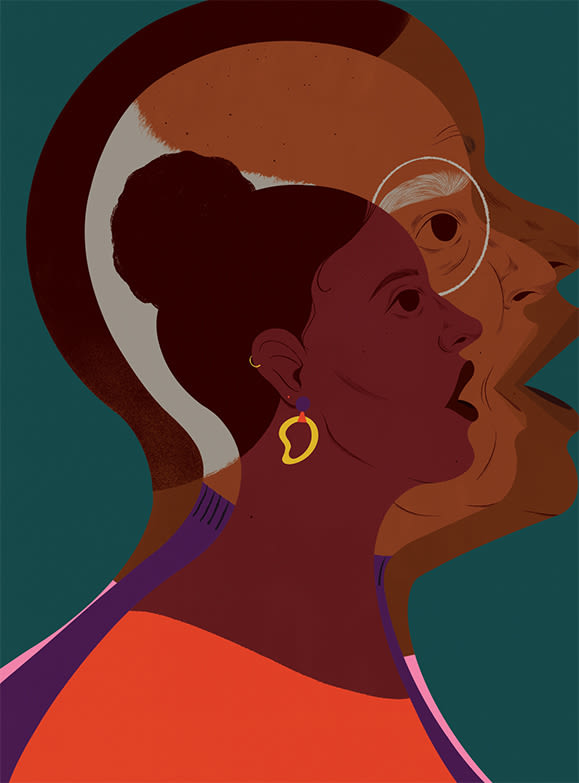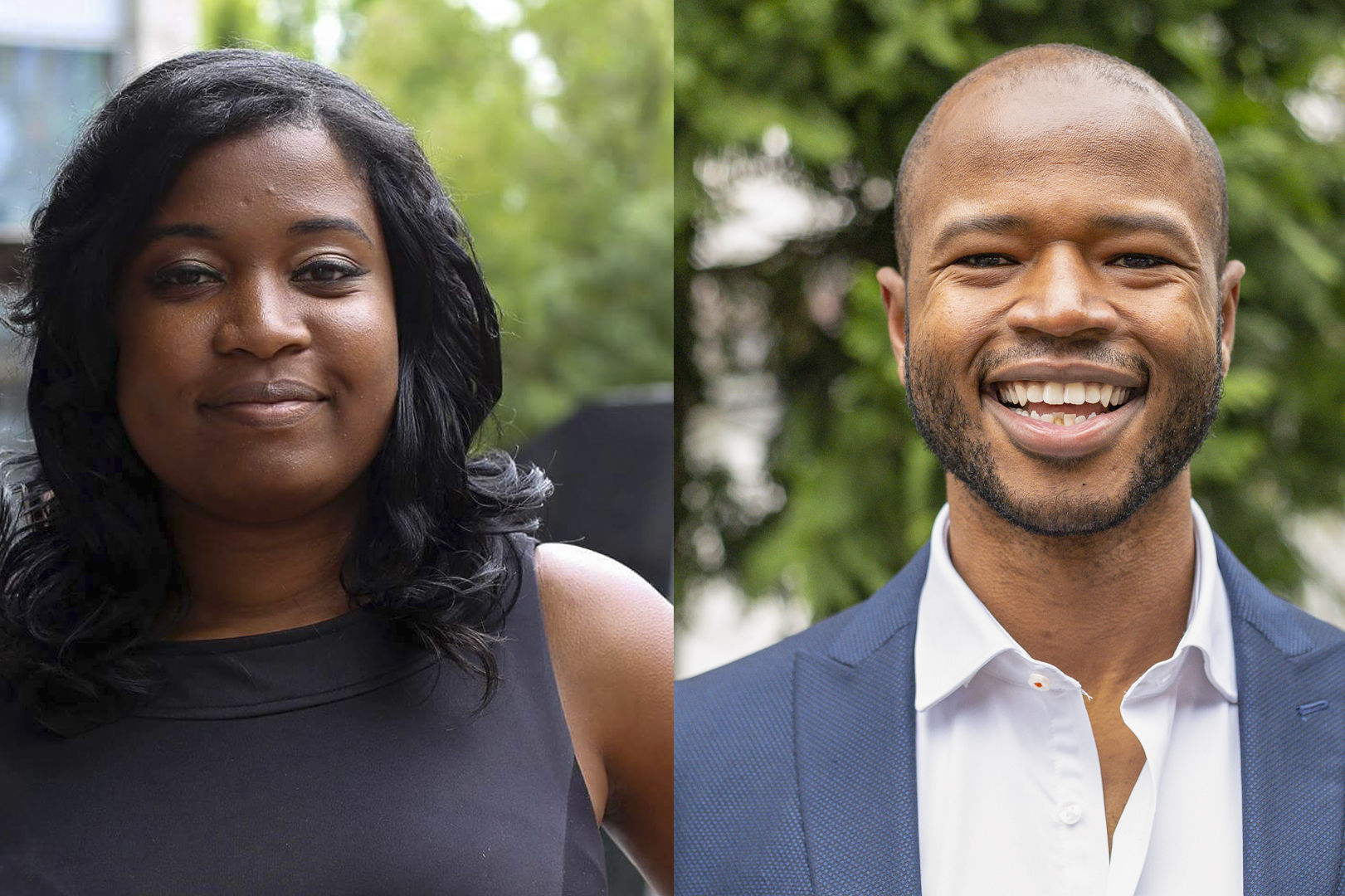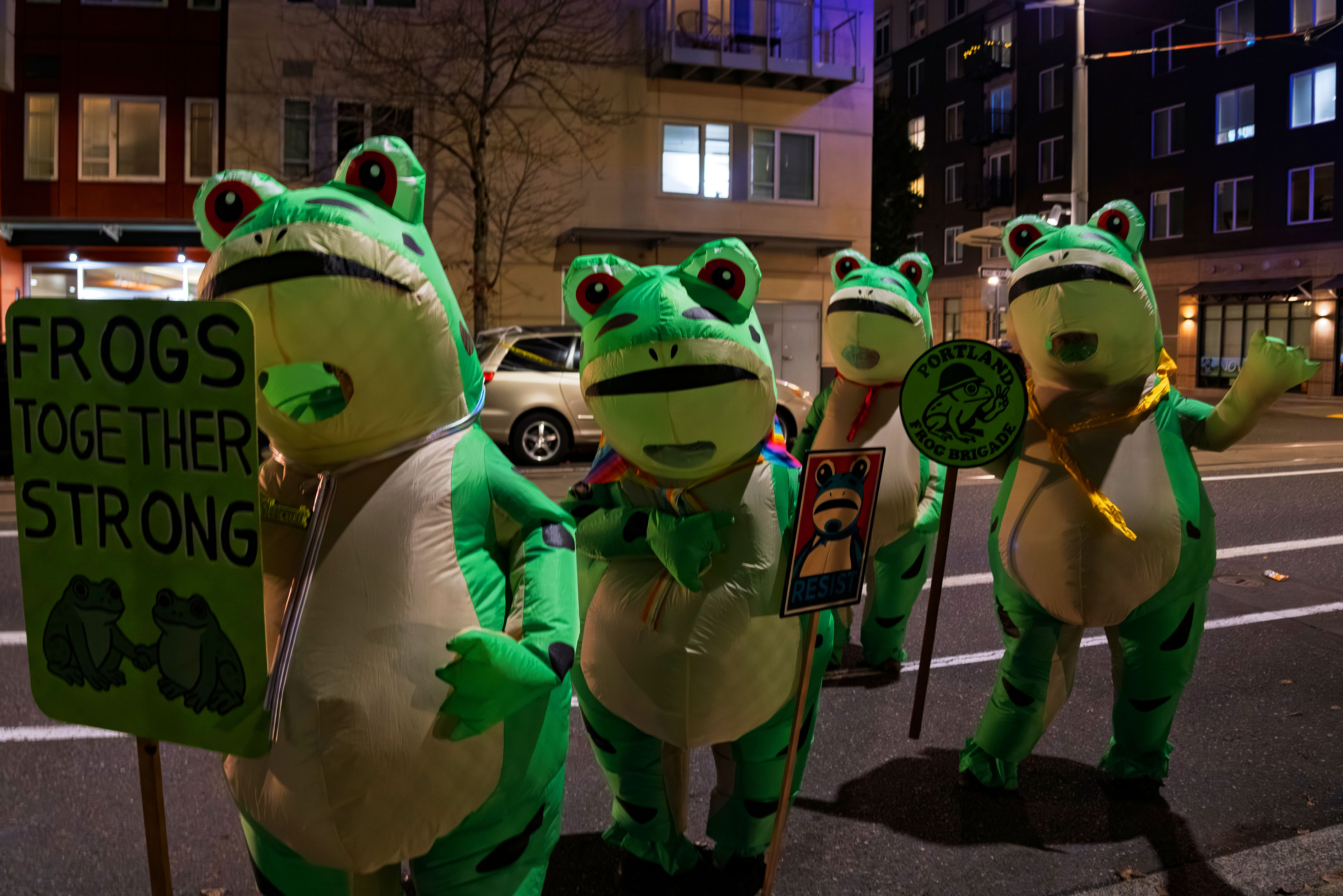Who Speaks for the Black Lives Matter Movement in Portland? It’s Complicated.

Portland’s Black community is relatively small—and yet, it certainly does not speak with a single voice.
Image: Carmen Deño
For months in 2020, Portland’s Black Lives Matter movement took international center stage, underscored by jarring images of local and federal law enforcement agents descending on protesters with tear gas and excessive force in the city’s streets.
Now many of the cameras, and a lot of the white people who took to the streets, are gone, but the core issues remain. That’s left the leaders of Portland’s Black community—many of whom have been deeply involved in civil rights work for decades—working to transform the summer’s momentum into tangible change, in 2021 and beyond.
But there are powerful differences of opinion about the best way forward, leaving plenty of room for generational and political divides among organizers with varying strategies and approaches to reform.
“We want to make sure the conversation about Black experiences in this moment is reflective of all,” says Donovan Smith, a local activist who helped spearhead Rise Up PDX, a movement for new leadership at the Portland chapter of the NAACP, after the summer’s protests. “We all have very different views about certain topics right now.”
Those views were thrown into sharp relief in July, when the local NAACP’s then-president (more on him later) raised eyebrows when he penned an opinion piece for the Washington Post that termed the ongoing protests in Portland a “white spectacle.”
Established Black-led organizations like the NAACP often push for change within the existing political and social framework, looking to politicians like Portland City Council member Jo Ann Hardesty and the members of the Oregon Legislature’s Black, Indigenous, and People of Color Caucus to champion their policy proposals. Meanwhile, some newer groups have embraced notably different ideologies.
One establishment group that has the ear of political leaders is Reimagine Oregon, a policy framework that incorporated proposals by the Urban League of Portland, Portland African American Leadership Forum (now renamed Imagine Black Futures), and the Coalition of Communities of Color, among others.
Reimagine Oregon called for specific change across a spectrum of areas, including education, police divestment, and economic development, matching policy initiatives with dollar figures and tasking specific elected officials with championing individual goals. And it had significant initial success, with the Oregon Legislature backing some of their plans during emergency special sessions in summer 2020, including a ban on chokeholds and disclosure of disciplinary records of problematic officers who’ve used excessive force.
Lamar Wise, a 29-year-old Portland resident who has been a longtime activist with progressive groups including the ACLU and Washington County Ignite, a political action committee supporting BIPOC and LGBTQ+ people, was an early participant in Reimagine Oregon. He describes the group as a “work in progress.”
“As protests started, a lot of us just started to get inundated with requests. And so this is a way to help organize ourselves and all the asks that have been out there,” Wise says.
After its early successes, though, he said Reimagine Oregon has paused to “regroup and refocus,” especially given that many of the activists and advocates involved are often spread too thin.
Perhaps the best-known long-standing Black-led organization, the Portland branch of the NAACP, is in turmoil, after its longtime president, E. D. Mondainé, was accused of sexual and physical abuse by three people in an October story in the Portland Mercury and subsequently announced his resignation. Mondainé was already facing pushback, including from a slate of members who sought to unseat him in the organization’s next election, uncomfortable with his position as a spokesperson for a movement that seemed to be passing him by.
“People [were] looking for a voice to speak to what’s happening, and the president [had] been one of the first in line because the NAACP has such a strong brand and reputation,” says Smith.
Meanwhile, the establishment approach—working to create change within the system—hasn’t always resonated with a younger generation of activists, including those who spent night after night protesting on the streets this past summer.
Candace Avalos, a student government coordinator at Portland State University who ran unsuccessfully in the May 2020 primary for a city council seat, says she and other young leaders “felt there were prominent Black voices that were rising to the top in a moment where we felt that younger voices that were at the front lines of this movement needed to be featured.”
Avalos is one of the founders of the Black Millennial Movement, which formed in June, along with Black Resilience Fund cofounder Cameron Whitten and Portland Public Schools director of community engagement Shanice B. Clarke (both of whom, like Avalos, have run for office in recent years). The collective’s goal is to uplift and involve millennial Portland activists, though they are so far light on specific policy objectives.
The Black Millennial Movement does pride itself on being a part of earlier protest planning and has joined forces with the ACLU to file suit against Donald Trump and the US Department of Homeland Security, alleging agents sent to protect a federal courthouse targeted Black Lives Matter protesters with excessive force and illegally detained protesters.
Building on this early momentum will take resources, says Whitten, whose unaffiliated mutual aid fund has already raised, at press time, over $2 million and distributed more than $1.5 million to local Black residents who’ve applied for help.
“We want to help guide this thing,” Whitten says. “And now the question really is, is Portland ready to really show that they are invested in building the capacity of leadership of Black millennials? That’s going to take real resources and it’s going to take
accountability.”
Though these leaders all say they support the intent of the protests, they aren’t necessarily on the ground night after night, where hard-core demonstrators, with a more decentralized structure, have continued to gather.
Another prominent voice is Don’t Shoot PDX founder Teressa Raiford, who has called for a wholesale restructuring of the police system. Raiford—a Portland native whose 19-year-old nephew was a victim of gang violence—says she’s never been approached by Reimagine Oregon, though there are some commonalities in their goals.
Her focus, she says, is accountability: “[I’m] trying to demand audits around the Gang Task Force, our education system, our health care resources, and all of our housing, what was actually being done besides policing the Black community within the state of Oregon that could lead to ending violence.”
Raiford’s views have resonated strongly with some activists, and fueled a long-shot grassroots write-in campaign in Portland’s mayoral election this fall. She had some traction but didn’t come close to a win.
“A lot of the work that I have done has been promoting awareness around the racism that’s embedded in policy,” Raiford said before the results rolled in. “One of the main things that I’ve used as a directive and tool for dismantling [institutional white supremacy] is not trying to reform policy but trying to hold it accountable through direct action and audits and getting information on the record, so that we can see the recommendations that are necessary to reconstruct policy.”




